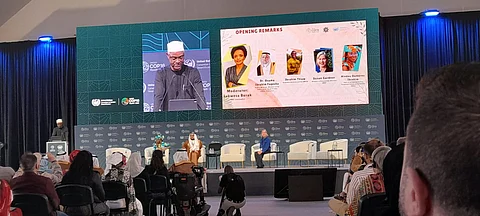

Indigenous peoples of the world have a very important role to play in combating desertification, the 16th Conference of Parties (COP16) to the United Nations Convention to Combat Desertification (UNCCD) recognised in Riyadh, Saudi Arabia, on December 7, 2024.
First Nations are the ‘gatekeepers of green areas’, which occupy 22 per cent of the globe, Osama Ibrahim Faqueeha, deputy minister in the Saudi environment ministry, said in his opening remarks during a high-level event on indigenous peoples.
Faqueeha gave the example of his own country, where there is a long tradition of protecting grasslands.
Communities in the eastern part of Saudi Arabia know how to catch water in rainwater harvesting structures. Those in the central parts of the country have developed underground canal systems to trap and conserve rainwater.
The minister added that rural Saudi communities have in-depth knowledge on how to protect coral reefs. They even know which branch to cut from a tree without disturbing ecosystems. City dwellers, on the other hand, are mostly disconnected from nature.
Indigenous people today are bearing the brunt of climate change, said Faqueeha. Rural development programmes are helping local Saudi communities build on traditional practices to protect water sources, land and biodiversity, he added.
UNCCD Executive Director Ibrahim Thiaw observed that while indigenous people represent just five per cent of the world’s population of the world, they are the protectors of the globe’s biodiversity.
Thiaw, who hails from the North African country of Mauritania, alluded to the marginalised people of the Middle East North Africa (MENA) region. Pastoral peoples of the world, like the Bedouin in MENA, have had their land rights taken away. This has marginalised them, especially the women. They are not involved in decision-making for land and water management.
He called for bold action and vision to partner with indigenous communities. Indigenous knowledge should be valued and guide the decisions of the world for protection of green areas, said Thiaw.
United Nations Environment Ecosystems (UNEP) Division Director Susan Gardner said science and traditional knowledge should go hand-in-hand to protect the planet.
Other COPs which resulted from the 1992 Earth Summit – United Nations Framework Convention on Climate Change and Convention on Biodiversity – have already recognised indigenous communities’ traditional wisdom.
Gardner stressed on four points. Indigenous communities should have a formal seat at the decision- making table. There is also a need to amplify local knowledge and include it in national strategies.
The UNEP official also emphasised that indigenous people should have land rights and direct access to finance. She added that UNEP is committed to providing better support to traditional knowledge.
Hindou Oumarou Ibrahim, Chair of the Forum of Indigenous Issues, said in the opening session that the indigenous people can help combat desertification and land degradation. “We need a historic decision in COP16 on the role of local communities,” said Ibrahim. She also appreciated the need for direct access to finance by the communities.